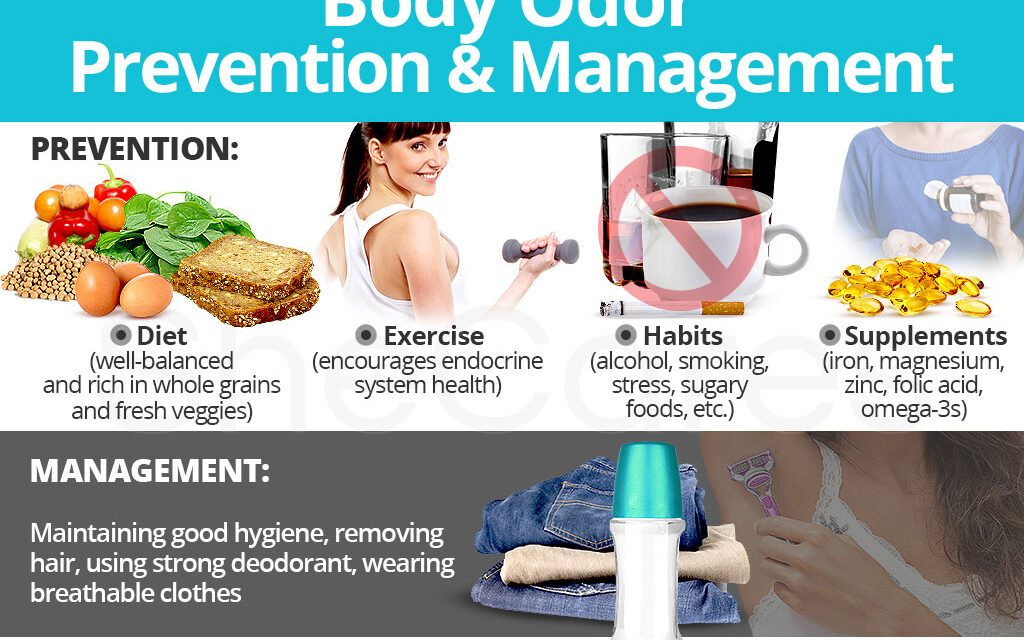Body odor is caused by a mix of bacteria and sweat on your skin. Your body odor can change due to hormones, the food you eat, infection, medications, or underlying conditions like diabetes. Prescription-strength antiperspirants or medications may help.
OVERVIEW
In this article, we will take full knowledge about Body Odor, which would be given by Pritish Kumar Halder.
What is body odor?
Body odor is what you smell when your sweat comes in contact with the bacteria on your skin. Sweat itself doesn’t smell, but when the bacteria on your skin mix with your sweat, it causes an odor. Body odor can smell sweet, sour, tangy or like onions. The amount you sweat doesn’t necessarily impact your body odor. That’s why a person can have an unpleasant body odor but not be sweaty. Conversely, a person can sweat excessively but not smell. This is because body odor is a result of the type of bacteria on your skin and how that bacteria interacts with sweat, not the sweat itself.
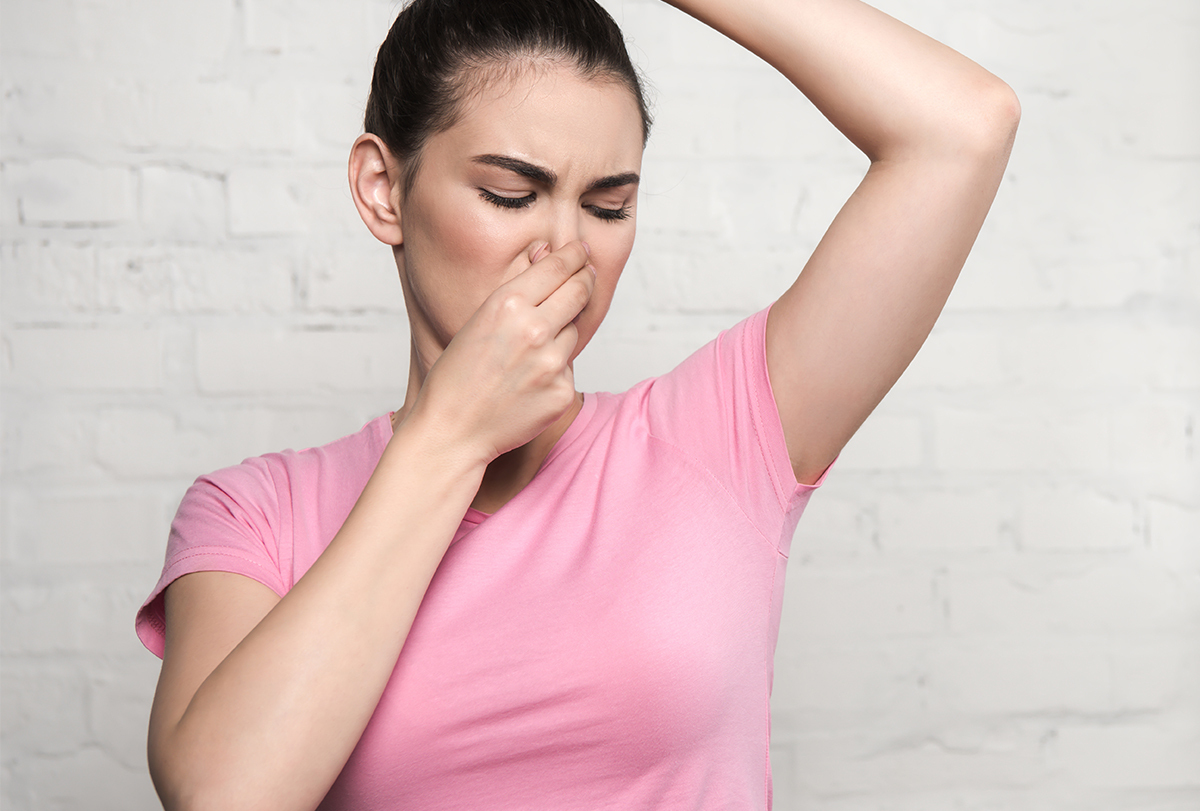
Sweating is the secretion of fluids by sweat glands onto your skin’s surface. There are two types of sweat glands: eccrine and apocrine. Apocrine glands are responsible for producing body odor.
Eccrine glands
Eccrine glands secrete sweat directly to the surface of your skin. As the sweat evaporates, it helps cool your skin and regulate your body temperature. It doesn’t produce a smell. When your body temperature rises due to physical exertion or being hot, the evaporation of sweat from your skin produces a cooling effect. Eccrine glands cover most of your body, including palms and soles.
Apocrine glands
Apocrine glands open up into your hair follicles. Hair follicles are the tube-like structure that keeps your hair in your skin. You can find apocrine glands in your groin and armpits. These glands produce sweat that can smell when it comes in contact with bacteria on your skin. Apocrine glands don’t start working until puberty, which is why you don’t smell body odor in young children.
Sweating is a natural body process, but due to certain foods we eat, hygiene practices or genetics, sweat can have a bad smell once it comes into contact with your skin. Changes in the amount you sweat or the smell of your body odor could indicate a medical condition.
Who is more likely to experience foul body odor?
Men and people assigned male at birth (AMAB) have more frequent problems with body odor because they have more hair (so they have more apocrine glands). Apocrine glands become active once a person reaches puberty, so body odor doesn’t begin until adolescence.
POSSIBLE CAUSES
What causes body odor?
Body odor happens when bacteria on your skin come in contact with sweat. Our skin is naturally covered with bacteria. When we sweat, the water, salt and fat mix with this bacteria and can cause odor. The odor can be bad, good or have no smell at all. Factors like the foods you eat, hormones or medications can affect body odor. A condition called hyperhidrosis makes a person sweat excessively. People with this condition may be more susceptible to body odor because they sweat so much, but it’s often the eccrine sweat glands that cause the most discomfort with sweaty palms and feet.

Every time you sweat, there’s a chance you’ll produce an unpleasant body odor. Some people are more susceptible to foul body odor than other people.
Other factors that can affect body odor are:
- Stress or anxiety.
- Hot weather.
- Being overweight
Why does my sweat smell bad?
There can be several reasons your sweat smells bad. For example, certain medications, supplements or foods can make your sweat smell bad. Remember, the sweat itself isn’t what smells; it’s the bacteria on your skin combined with the sweat.
Several medical conditions and diseases are associated with changes in a person’s usual body scent:
- Menopause
- Diabetes
- Gout
- Overactive thyroid.
- Liver disease.
- Kidney disease.
- Infectious diseases
If you have diabetes, a change in body odor could be a sign of diabetes-related ketoacidosis. High ketone levels cause your blood to become acidic and your body odor to be fruity. In the case of liver or kidney disease, your odor may give off a bleach-like smell due to toxin buildup in your body.
Do hormonal changes cause body odor to smell?
Yes, changes in hormones can cause your body odor to smell. Hot flashes, night sweats and hormonal fluctuations experienced during menopause cause excessive sweating, which leads to changes in body odor. Some people believe their body odor changes when they’re pregnant or menstruating. Research suggests a person’s body odor changes during ovulation (the time in a person’s menstrual cycle when they can become pregnant) to attract a mate.

Can certain foods cause body odor?
The saying, “you are what you eat,” may apply to body odor. If you eat food rich in sulfur you may develop body odor. Sulfur smells like rotten eggs. When it’s secreted from your body in your sweat, it can put off an unpleasant smell. Examples of sulfur-rich foods are:
- onions
- garlic
- cabbage
- broccoli
- cauliflower
- red meat
Other common dietary triggers of bad body odor are:
- Monosodium glutamate (MSG).
- caffeine
- Spices like curry or cumin.
- Hot sauce or other spicy food.
- alcohol
Eliminating or reducing these triggers may help improve your body odor.
CARE AND TREATMENT
How do doctors treat bad body odor?
Treatments for excessive sweating and body odor depend on the underlying cause, which your healthcare provider can determine through a physical exam and blood or urine tests.
Treatment for body odor could include:
Personal hygiene and lifestyle
Keep your skin clean by taking a daily bath or shower with antibacterial soap. Focus on the areas where you sweat the most, like your armpits and groin area. Removing some of the bacteria on your skin regularly can prevent unpleasant body odor.
Keep your armpits shaved, so sweat evaporates quickly and doesn’t have as much time to interact with bacteria. Hair is a breeding ground for bacteria.
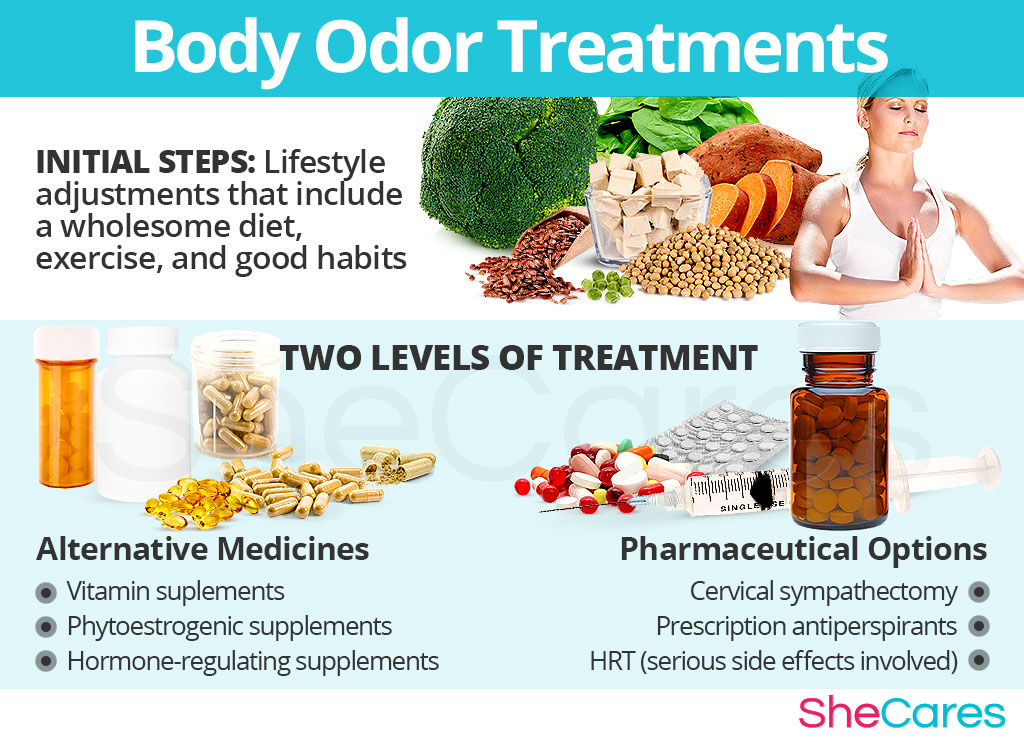
Regularly wash clothing, and wear clean clothes.
Wear loose-fitting clothing made of cotton. This allows your skin to breathe. This rule also applies to underwear and bras. Moisture-wicking (fabric that can pull moisture away from your skin) clothing is also helpful.
Use a topical antiperspirant, which works by pulling sweat back into your sweat glands. Sweat production decreases when your body receives a signal that your sweat glands are full. These include over-the-counter, as well as prescription, antiperspirants.
Try removing overly smelly foods from your diet or pay attention to if specific foods make your body odor worse. Garlic, onions and alcohol are a few examples of food that may make your sweat smell more unpleasant.
Find ways to reduce your stress levels. Stress can cause your apocrine glands to activate.
Medications or procedures
Small injections of botulinum toxin (like Botox®) in your armpits can temporarily block sweating.
Prescription medicines may prevent sweating. If your healthcare provider suggests this, they’ll caution you to be careful about using it because your body needs to sweat to cool itself when needed.
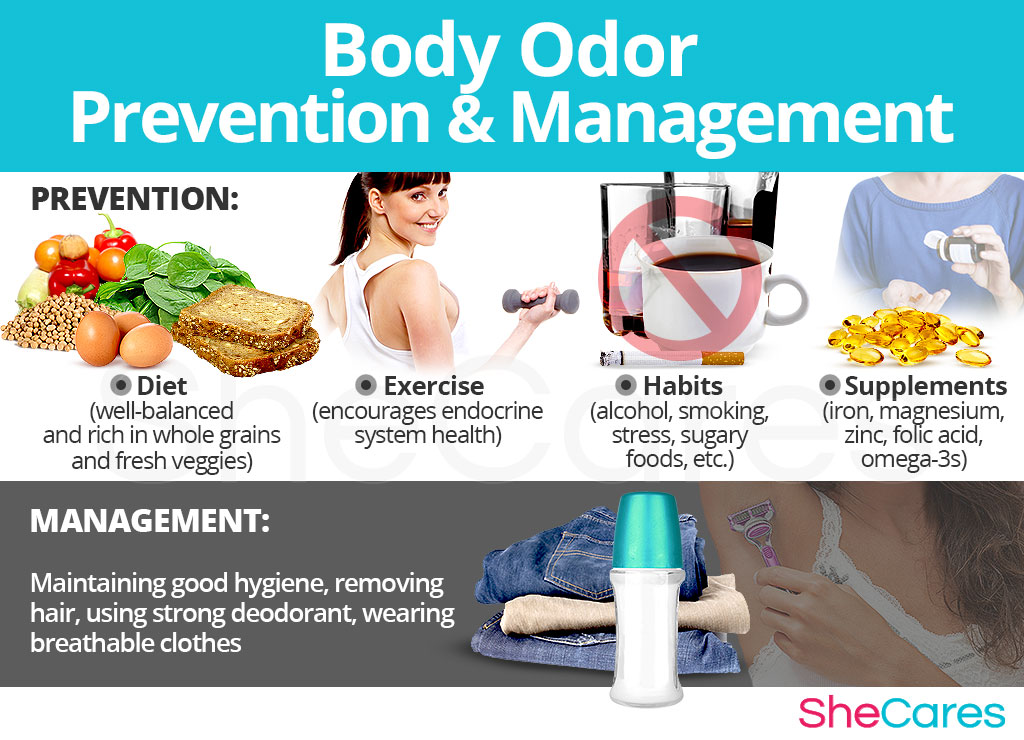
There are some severe conditions that require surgery, which involves removing sweat glands from under your arms or preventing nerve signals from reaching your sweat glands.
Antibiotics to reduce the bacteria on your skin.
A hand-held device that emits electromagnetic waves can destroy sweat glands under your arms.
How do you get rid of body odor naturally?
If you want a more natural approach to treating armpit body odor, there may be options that work. Talk to your healthcare provider about:

Baking soda
Make a paste using baking soda and water. Apply the paste to your armpits and let it dry. Baking soda balances the acid on your skin and reduces odors.
Green tea
Put green tea bags in warm water. Place the soaked tea bags under your armpits for several minutes a day. Green tea may help block your pores and reduce sweating.
Apple cider vinegar
Mix apple cider vinegar with a small amount of water in a spray bottle. Spray the mixture onto your armpits. The acid in vinegar helps kill bacteria.
Lemon juice
Mix lemon juice and water in a spray bottle. Spray the mixture under your arms. The citric acid in lemon juice kills bacteria.
What deodorant is best for armpits that smell?
Deodorants work by masking body odor with a more pleasant-smelling fragrance. Antiperspirants, on the other hand, reduce how much you sweat. Make sure you use an underarm product that says “antiperspirant” on the packaging. The active ingredient in most antiperspirants is aluminum. Apply antiperspirant after showering or bathing and before bed. Make sure you apply antiperspirants to dry skin for the best results.
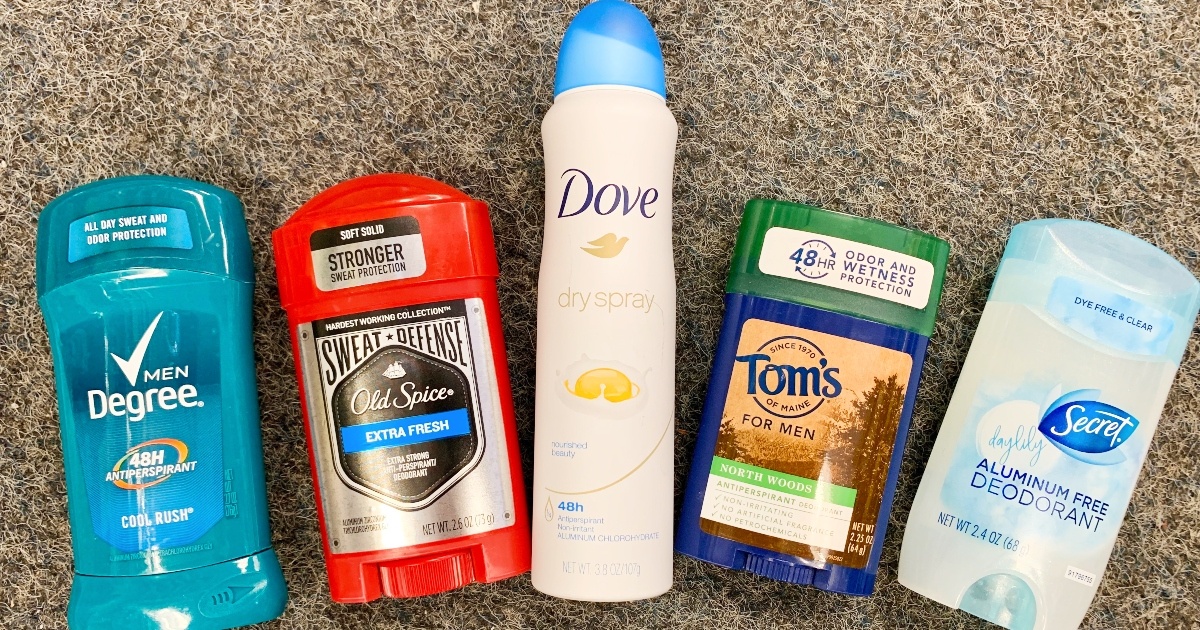
If over-the-counter antiperspirants don’t help, your healthcare provider may be able to prescribe a stronger antiperspirant.
What soap is best for body odor?
Antibacterial soaps wash away the bad bacteria on your skin. Look for products at your local drug store that says “antibacterial” on the packaging. Using cleansers or spot treatments containing benzoyl peroxide (like Pan Oxyl® or Clearasil®) may also help. Benzoyl peroxide can also reduce the number of bacteria on your skin.

WHEN TO CALL THE DOCTOR
What symptoms of sweating and body odor are cause for concern?
Frequent sweating or sweat-soaked clothing, even when not physically active or in a warm setting.
Sweating so much that it interferes with daily activities such as trying to hold a pen, turn a doorknob or use a computer.
- Sweating while sleeping.
- Skin consistently damp with sweat.
- Frequent skin infections in body areas prone to sweating.
- A fruity body odor, which could indicate diabetes.
- A bleach-like body odor, which could be a sign of liver or kidney disease.
- A sudden change in body odor or increase in sweating.
Bacteria on your skin cause body odor. It’s completely normal to have a natural body odor and isn’t necessarily related to how much you sweat. Sweat itself is odorless. Some medical conditions, genetics, being overweight or eating certain foods could make you more susceptible to bad body odor. If you’re self-conscious about your body odor, there are things you can try to reduce or mask the unpleasant smell. Using a stronger antiperspirant, shaving and washing with antibacterial soap several times a day can help. If none of these solutions work for you, contact your healthcare provider. They may recommend a prescription treatment or run tests to rule out other conditions.
6 Tips for Reducing Body Odor
Ever had that moment where you wonder if you smell, well, not so great? It happens. But you can do a few things to make body odor go away.
-
Keep Yourself Squeaky Clean
Shower at least once a day, and you’ll wash away sweat and get rid of some of the bacteria on your skin.
Sweat by itself is basically odorless. But when the bacteria that live on your skin mix with sweat, they multiply quickly and raise quite a stink.
Washing thoroughly, especially the areas where you tend to sweat, can help with body odor.
-
Use Antibacterial Soap
Washing thoroughly with an antibacterial soap bar will help get rid of some bacteria, which can help with the odor.
ADVERTISEMENT
Look for the word “antibacterial” on the soap’s packaging.
-
Towel Off Well
Once you’ve showered, dry yourself completely, paying close attention to any areas where you sweat a lot.
If your skin is dry, it’s harder for bacteria that cause body odor to breed on it.
-
Use ‘Industrial Strength’ Antiperspirants
Once you’re clean and dry, use a strong antiperspirant on your underarms. These have aluminum chloride, a chemical that helps keep sweat at bay, and they often also have a deodorant in them. Use it twice a day — once in the morning and once in the evening.
You don’t need a prescription to get a powerful antiperspirant. Look for ones that say they’re higher strength.
If you think you need more help, ask your doctor about prescription antiperspirants.
-
Keep Your Clothes Clean
Change clothes often when you’re sweating heavily. Fresh clothes help keep body odor down.
Be sure to change your socks as well, especially if you tend to have foot odor. Use deodorant powders in your shoes, replace insoles often, and go barefoot when possible.
-
Cut Out or Cut Back on Certain Foods or Drinks
What you eat affects your body odor. Foods that tend to make you sweat more, such as hot peppers or other spicy foods, might also lead to body odor. And the aroma of foods like onions or garlic can be carried in your sweat. Drinks with caffeine or alcohol may also make you sweat more.
Reference
https://www.webmd.com/skin-problems-and-treatments/reduce-body-

